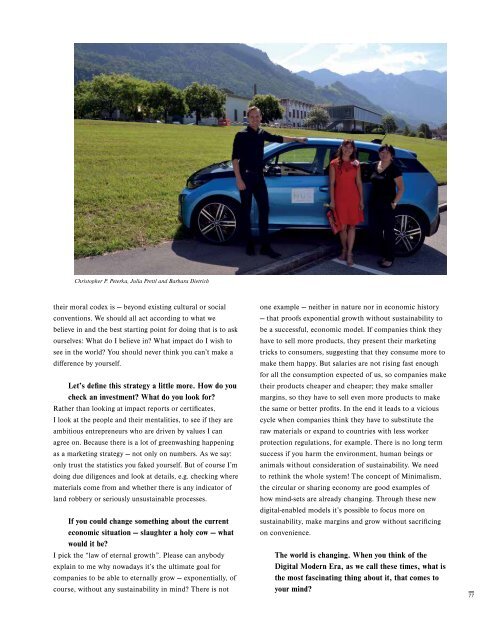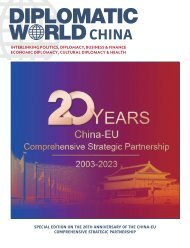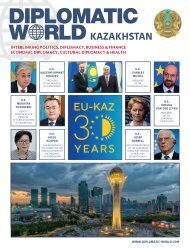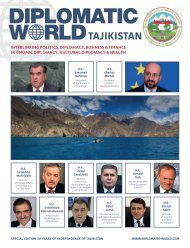Diplomatic World nummer 54
You also want an ePaper? Increase the reach of your titles
YUMPU automatically turns print PDFs into web optimized ePapers that Google loves.
Christopher P. Peterka, Julia Prettl and Barbara Dietrich<br />
their moral codex is — beyond existing cultural or social<br />
conventions. We should all act according to what we<br />
believe in and the best starting point for doing that is to ask<br />
ourselves: What do I believe in? What impact do I wish to<br />
see in the world? You should never think you can’t make a<br />
difference by yourself.<br />
Let’s define this strategy a little more. How do you<br />
check an investment? What do you look for?<br />
Rather than looking at impact reports or certificates,<br />
I look at the people and their mentalities, to see if they are<br />
ambitious entrepreneurs who are driven by values I can<br />
agree on. Because there is a lot of greenwashing happening<br />
as a marketing strategy — not only on numbers. As we say:<br />
only trust the statistics you faked yourself. But of course I’m<br />
doing due diligences and look at details, e.g. checking where<br />
materials come from and whether there is any indicator of<br />
land robbery or seriously unsustainable processes.<br />
If you could change something about the current<br />
economic situation — slaughter a holy cow — what<br />
would it be?<br />
I pick the “law of eternal growth”. Please can anybody<br />
explain to me why nowadays it’s the ultimate goal for<br />
companies to be able to eternally grow — exponentially, of<br />
course, without any sustainability in mind? There is not<br />
one example — neither in nature nor in economic history<br />
— that proofs exponential growth without sustainability to<br />
be a successful, economic model. If companies think they<br />
have to sell more products, they present their marketing<br />
tricks to consumers, suggesting that they consume more to<br />
make them happy. But salaries are not rising fast enough<br />
for all the consumption expected of us, so companies make<br />
their products cheaper and cheaper; they make smaller<br />
margins, so they have to sell even more products to make<br />
the same or better profits. In the end it leads to a vicious<br />
cycle when companies think they have to substitute the<br />
raw materials or expand to countries with less worker<br />
protection regulations, for example. There is no long term<br />
success if you harm the environment, human beings or<br />
animals without consideration of sustainability. We need<br />
to rethink the whole system! The concept of Minimalism,<br />
the circular or sharing economy are good examples of<br />
how mind-sets are already changing. Through these new<br />
digital-enabled models it’s possible to focus more on<br />
sustainability, make margins and grow without sacrificing<br />
on convenience.<br />
The world is changing. When you think of the<br />
Digital Modern Era, as we call these times, what is<br />
the most fascinating thing about it, that comes to<br />
your mind?<br />
77


















